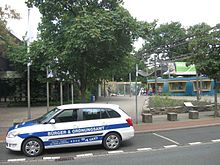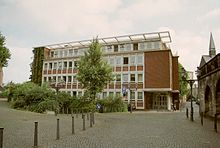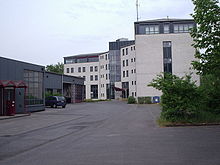City administration of Duisburg
|
City of Duisburg |
|
|---|---|
| State level | City administration |
| position | Local self-government |
| legal form | District-free city |
| Supervisory authority | Government President of the administrative district of Dusseldorf , Birgitta Radermacher |
| Headquarters | Duisburg |
| Authority management | Lord Mayor Sören Link |
| Servants | 6,203 (as of December 31, 2015), 1,431 of them part-time |
| Budget volume | 1.367 billion euros (income 2012) or 1.485 billion euros (expenses 2012) |
| Web presence | www.duisburg.de |
The city administration of Duisburg is the municipal self-government of the city of Duisburg . The city administration of Duisburg consists of seven departments , each headed by an alderman as a municipal electoral officer and the department of the mayor . The Duisburg city administration employs around 6181 people, including 3,945 women and 2,209 men (as of December 31, 2015). The average age in 2013 was 45.4 years. This does not include the employees at the legally independent business operations Duisburg AöR (approx. 1,600). In the case of the Eigenbetriebsähnl. Institutions work a further 716 people (as of 2013).
The mayor has his official residence in Duisburg's town hall on Burgplatz. In the absence of a central administrative building, the city administration is spread across numerous larger and smaller buildings throughout the city. The largest administrative buildings are the AEG-Haus Sonnenwall 77, the skyscraper Friedrich-Wilhelm-Straße 96, the Stadthaus and the Nürnbergerhaus.
Since 1999, the mayors of North Rhine-Westphalia no longer represent their cities and municipalities exclusively politically, but also lead the local government . Until 1999, the city administration was headed by a full-time senior city director, while the mayor was only the chairman of the city council (this was colloquially referred to as dual leadership).
Structure of the administration
Administrative structure plan of the city of Duisburg (as of October 1, 2019):
Department OB
Sören Link (SPD) has been Lord Mayor of the city of Duisburg since July 1, 2012 .
Subordinate departments:
- OB-01/02 Staff position of the OB
- OB GF-01 Staff Unit Regional Structural Development, Funding Monitoring and University Affairs
- OB-GF-02 Compliance , Corruption Prevention and Business Ethics
- OB-GF-03 Strategic Marketing Unit
- OB-1 Department for Politics, Administration and Representation
- OB-3 Unit for Equal Opportunities (Women's Office)
- OB-4 Unit for Citizen Engagement and Communication
- OB-6 Municipal Integration Center (KIZDU, formerly RAA )
- OB-01 Institute for Occupational Safety and Health
- OB-02 Office of the Study Institute for Local Administration
- 10 Main office including the "Call Duisburg" service center
- 11 Personnel Office
- 14 Audit Office
Department I - Finances, Investments and European Affairs
Subordinate departments:
- I-01 Staff Unit Participations
- I-02 Project " Consolidation Management "
- I-03 Office for Elections, European Affairs and Information Logistics
- I-04 Project Investment Plan
- 20 combing
- 21 Office for Accounting and Taxes
Department II - Security and Law
Subordinate departments:
- II-01 Staff Unit Special Projects
- II-02 Data Protection Unit
- II-KUB Staff Department Crisis Management and Civil Protection
- 30 Legal office including submission office
- 32 Citizens and Public Order Office (including road traffic authority and registry office )
- 37 Fire brigade and civil protection office
- 91-97 Supervision of the district offices (Walsum, Hamborn, Meiderich-Beeck, Homberg-Ruhrort, Mitte, Rheinhausen and South)
Department III - Family, Education and Culture
Subordinate agencies
- 40 Office for School Education
- 41 cultural businesses in Duisburg, with:
- 41-2 City Theater Duisburg
- 41-3 Duisburg Philharmonic
- 41-4 Duisburg City Archives
- 41-5 Museum of Culture and City History Duisburg (KSM)
- 41-6 Museum of German Inland Shipping
- 42 Duisburg City Library
- 43 Adult Education Center (VHS) including music school
- 51 youth welfare office (with approx. 80 day-care centers )
- 54 Institute for Youth Welfare
Department IV - Labor, Social Affairs and Sport
Subordinate agencies
- 50 Office for Social Affairs and Housing
- Job center Duisburg (shared facility with the employment agency ; Duisburg is not an optional municipality )
- DuisburgSport (in-house facility) including sports facilities, pools
Department V - Urban Development
Subordinate departments:
- V-01 investment support
- V-02 Strategic Urban Development Unit
- V-03 Strategic Infrastructure Unit
- V-04 Advice center for planning, building and transport
- 61 Office for Urban Development and Project Management
- 62 Office for Construction Law and Construction Advice
- IMD Immobilien-Management Duisburg (own establishment)
Department VI - Environment, Health and Consumer Protection
Subordinate departments:
- VI-01 Climate Protection Unit
- 31 Office for the Environment and Greenery
- 53 Health Department
- 53-5 Institute for Consumer Health Protection
Municipal characteristics

Spin-offs and privatizations
In the past 15 years, numerous parts of the city administration have been outsourced, e.g. T. privatized. In 2013, the city administration only had around half of the workforce compared to 1999. In addition, a large number of staff were cut directly, although there have been no redundancies for many years , as the city is on an agreement with the unions and staff councils Has agreed a social agreement that should enable socially acceptable savings.
The following institutions in which the city of Duisburg is involved do not belong directly to the city administration:
- Job center Duisburg (a joint facility with the Employment Agency , formerly ARGE) with approx. 300 municipal employees
- Wirtschaftsbetriebe Duisburg AöR, made independent in 2007 as an institution under public law , with around 1,600 employees
- Municipal clinics and retirement homes, since 2000, initially with a minority share of the Sana Kliniken company (49%), converted into a private legal form as the Duisburg Clinic (2 hospital facilities, 3 facilities for elderly care homes), approx. 1,700 employees. In 2015 the remaining shares of the city of Duisburg (up to 1%) were sold to the company Sana.
- DVV group, consisting of the parent company Duisburger Versorgungs- und Verkehrsgesellschaft and u. a. the subsidiaries
- Duisburg Transport Company (DVG)
- Stadtwerke Duisburg AG (proportional shareholder RWE),
- YOU-IT
- Octeo (service company)
- Other proprietary companies and participations (list is not exhaustive)
- Society for Economic Development (together with the IHK)
- Zoo Duisburg AG
- Gebag / Duisburg construction and management company (DBV)
- Duisport / Logport
- Frischkontor Duisburg (renaming in preparation)
- Development company Duisburg (EG DU)
- Inner Harbor Development Company
- Wilhelm Lehmbruck Museum Foundation
- Addiction Aid Association Duisburg (together with the Diakonie)
- Employment Promotion Society (GfB)
- Workshop for disabled people Kalkweg
- Sparkasse Duisburg (together with the city of Kamp-Lintfort )
- Film forum Duisburg
- Duisburg Marketing GmbH (dissolved on January 1, 2015)
- Deutsche Oper am Rhein (together with the city of Düsseldorf )
Household security concepts
Similar to many other large cities, especially in the Ruhr area , Duisburg has been in a financial crisis for decades. The decline of the coal and steel industry and the decline in the associated trade tax income with simultaneously increasing expenditure for social purposes hit Duisburg as a monostructural region at the time .
Since 1977 household security concepts have been put in place, which were often associated with savings in terms of personnel and a restriction of infrastructure offers (pools, halls, sports fields, library branches, etc.). The city of Duisburg has not been able to achieve a budget balance for more than 20 years; The municipal budget has not been approved by the municipal and financial supervisory authorities of the Düsseldorf district government for years. According to the new municipal financial management , i.e. the commercial bookkeeping introduced for the NRW municipalities a few years ago, there is overindebtedness , that is, the equity of the city of Duisburg has been used up.
So-called cash loans are actually only supposed to avoid short-term bottlenecks. However, the occasional injection of liquidity became a constant drain for numerous municipalities, including Duisburg. After numerous budget security concepts and increases in municipal income (such as taxes, fees) did not bring the desired success, the city is now to be rehabilitated in the medium term through the so-called Municipal Finances Strengthening Pact, which was launched by the state government of North Rhine-Westphalia in 2012. As a result, the city can count on additional allocations from the state of North Rhine-Westphalia (initially EUR 52.5 million annually, degressively from 2017), but must continue to make considerable savings, which continues to put the attractiveness for businesses, citizens and employees of the city administration to a severe test . In September 2012, the district government of Düsseldorf approved the budget restructuring plan presented by the city authorities. The same applies to the years 2013 and 2014. The 2015 budget, which includes an increase in property tax B by a rate of 855%, has been submitted for approval by the Düsseldorf district government. Almost 6,000 people from Duisburg asked the Düsseldorf district government not to approve the 2015 budget. Approval was granted in October 2015 after the city of Duisburg had issued additional statements on the DVV's economic situation.
Employee representation
The municipal employees elect interest groups in accordance with the State Personnel Representation Act of North Rhine-Westphalia (LPVG). The following employee representatives exist at the Duisburg city administration :
- General staff council
- Internal Administration Staff Council
- Personnel Council Fire Brigade and Civil Protection Office
There is an independent staff council at Wirtschaftsbetriebe Duisburg AöR , as well as at Sparkasse Duisburg . The in private law guided form own companies usually consist councils after the Works Constitution Act .
There are youth and trainee representatives assigned to the works councils or staff councils, as well as representatives for severely disabled employees .
Web links
- City of Duisburg - city administration
- Personnel structure report of the city of Duisburg for 2015 (PDF)
- Budget restructuring plan 2014 - 2021 (PDF)
- Official journal of the city of Duisburg
- Local law of the city of Duisburg
Individual evidence
- ↑ Budget planning of the city of Duisburg for the budget year 2014 (PDF; 754 kB) ( Memento of the original from March 4, 2016 in the Internet Archive ) Info: The archive link was inserted automatically and has not yet been checked. Please check the original and archive link according to the instructions and then remove this notice.
- ↑ Please enter either wayback - or webciteID - or archive-is - or archiv-url parameters
- ↑ Duisburg council decides to increase property tax to 855 percent ; derwesten.de, November 24, 2014, accessed on September 28, 2015







